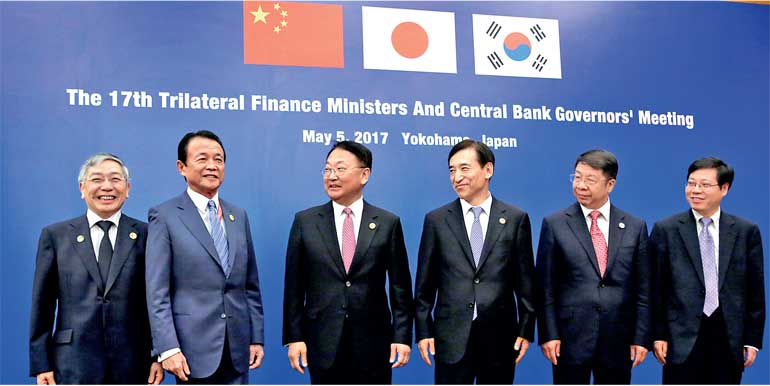Sunday Feb 22, 2026
Sunday Feb 22, 2026
Monday, 8 May 2017 00:08 - - {{hitsCtrl.values.hits}}
 Reuters: Finance leaders of Japan, China and South Korea agreed to resist all forms of protectionism in a trilateral meeting on Friday, taking a stronger stand than G20 major economies against the protectionist policies advocated by US President Donald Trump.
Reuters: Finance leaders of Japan, China and South Korea agreed to resist all forms of protectionism in a trilateral meeting on Friday, taking a stronger stand than G20 major economies against the protectionist policies advocated by US President Donald Trump.
In an attempt to reduce the region’s vulnerability to dollar swings, Japan also proposed forming bilateral swap arrangements with Southeast Asian nations that would allow it to provide yen funds in times of financial stress.
“We agree that trade is one of the most important engines of economic growth and development, which contribute to productivity improvements and job creations,” the finance leaders and central bank governors of the three nations said in a communique issued after their meeting.
“We will resist all forms of protectionism,” the communique said, keeping a line that was removed - under pressure from Washington - from a G20 communique in March when the group’s finance leaders met in Germany.
China has positioned itself as a supporter of free trade in the wake of Trump’s calls to put America’s interest first and pull out of multilateral trade agreements.
Japan has taken a more accommodative stance toward Washington’s argument that trade must not just be free but fair.
The trilateral meeting was held on the sidelines of the Asian Development Bank’s annual gathering in Yokohama, eastern Japan, where China’s increasing presence in infrastructure finance threatens to overshadow Japan’s economic influence in the area.
ADB President Takehiko Nakao, a former top Japanese currency diplomat, sought to dispel the view Japan and China are competing for influence, saying on Thursday his institution seeks to cooperate – not compete – in the region.
The talks came amid escalating tensions in North Korea, which moderated some of the optimism policymakers held over Asian’s economic outlook.
While the trilateral meeting’s communique said Asian economies were expected to maintain “relatively robust growth,” it warned remaining downside risks meant policymakers would require all necessary tools to achieve strong growth. “We will continue a high degree of communication and coordination among China, Japan and Korea to cope with possible financial instability in the context of increased uncertainty of the global economy and geopolitical tensions,” the communique said.
In a separate meeting, Japan proposed launching bilateral currency swap arrangements of up to 40 billion dollars to Southeast Asian nations that enable Tokyo to provide yen funds to these countries.
Tokyo says the arrangements would make yen funds more accessible to Japanese firms operating in the region and make Asian economies less dependent on dollar funding.
But analysts say the move is also aimed at countering the increasing presence of China, which entered into bilateral currency swap arrangements with about 30 countries to promote the yuan as an international currency.